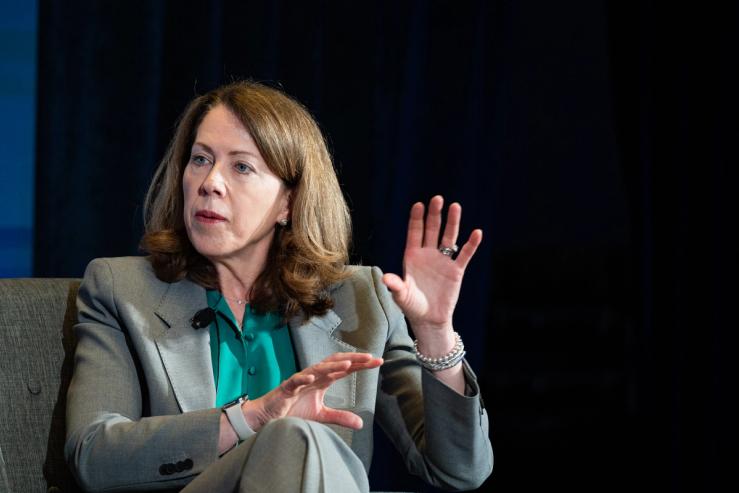The Scene
When Kate Johnson became CEO of Lumen Technologies in 2022, earnings at the regional US telecoms company once known as CenturyLink were in decline, it was on track to lose $1.5 billion for the year, and it was burdened with debt and obsolete products. By last year, with its stock price sinking towards the $1 mark at which it risked a delisting, Lumen had to restructure more than $15 billion of debt.
Last month, Johnson, a veteran of Microsoft, GE Digital, and Oracle, announced the sale of Lumen’s consumer fiber business to AT&T for $5.75 billion. She hailed the “financial freedom” the deal would provide Lumen by slashing its debt, interest costs, and capital expenditures. Strategically, the transaction also sharpened Lumen’s focus on the enterprise market, where Johnson is repositioning the company as “the trusted network for AI,” and capped a turnaround that has allowed it to strike deals with “hyperscalers” like Amazon Web Services, Google Cloud, and Microsoft, whose US operations Johnson once led.
Lumen’s stock is now back above $4, though still far from its highs of a decade or more ago. With a business-focused fiber-optic cable network that she plans to expand from 17 million miles to 47 million miles between this year and 2028, Johnson is eyeing an $80 billion enterprise networking market. “Fiber is critical infrastructure for the buildout of the backbone of the AI economy,” she says. But, she adds, unlocking its potential required a complete reset of the company’s culture.
This interview has been condensed and edited for clarity.
In this article:
The View From Kate Johnson
Andrew Edgecliffe-Johnson: Looking back to the task you took on when you became CEO in 2022, to what extent does this deal mark the end of that?
Kate Johnson: We were in a tough spot, like every other telco, experiencing revenue decline in our legacy business and paying a dividend that we really couldn’t afford. And my assignment was to pivot this company to growth.
It’s one thing to fix a company operationally. It’s another thing to do all that’s required to fix something operationally, to be healthier and more productive, and also to address a massive change in the marketplace — in this case, [the move to] multi-cloud [computing service] and AI. So we were not only fixing up the house, we’ve been moving to a new neighborhood at the same time.
We started with the people and with the culture. I’ve been both criticized and complimented for choosing that path. I think that the criticism is like, “Hey, the business is really in need of some attention, and you keep talking about culture.” But I also knew that [we needed to] give our people a reorientation about what good looks like. When your revenue is declining, you want to do that as slowly as possible, so you play not to lose. We shifted to play to win, [saying,] “Let’s take risks and go after things and win in new spaces with new capabilities and new markets and new customers.”
How did you change that culture and shift to playing to win?
It requires courage, vulnerability, resilience, and the ability to speak truth to power. When things aren’t going so well, pointing to things that are broken sounds like whining. When someone like me and my leadership team is trying to turn things around, we need to know where those things are. And if, in the past, you got scolded for pointing out problems, we needed to give everybody a sense of trust and psychological safety — that’s what we needed most.
We’re still on that culture change path. But the reason why I started that work early was because I knew we were going to go through some tough times. I’ve seen big and small changes over the course of my career, and it always boils down to whether or not the people enable the change.
How do you manage the decline of the legacy business, which is still providing a substantial amount of cash, while also shifting attention to new growth opportunities?
We carry the weight of the past as we build the future. It’s part of ambidextrous leadership. I can’t think of a single time in my career when I got to just work on the new thing. And ambidextrous leadership is about, how do I lead and run and get the most out of the business-as-usual, and then build the future at the same time? It’s two parts of the brain, and it’s really hard. And it’s not for everybody.
Every time I get in front of our company, I thank the people who are working on the legacy business pieces for paying our salaries. That’s the people side of it — gratitude, recognition, and celebration are all important.
But cannibalizing your own installed base to bring them to the future, even though that creates risk — that is playing to win. That’s what we do in technology. We reinvent our future every year or two, and then we go and bring customers through that life cycle.
You said recently that your critics and some of your friends thought you were crazy for taking this job. Was there a moment when you thought they might be right?
This may sound trite, but it’s true: I love solving complex problems, and I love being an underdog. And when you’re an underdog, you’re going to lose sometimes, but losing isn’t really that bad, because nobody expects you to win. It’s winning that’s so much more rewarding when nobody expects it.
So when the stock’s a buck and everybody’s saying you’re crazy and you don’t know what you’re doing, do you take it personally? It would be impossible not to be a little bit concerned, and I felt a lot of that pressure, but you’ve got to have the resilience to not focus on that. I could put the blinders on and say, “I know what it takes to change something really complex.” I think we have a right to win, and I want to show the world what it looks like to do so. It’s that underdog lens: You’ve got to keep your eye on the prize. You’ve got to play offense, always.
Notable
- In a commencement address at Lehigh University last month, Johnson told students worried about AI and other disruptions, “The world’s been a hot, hot mess for a long time” but “every single time, humans figure it out.”
- AT&T CEO John Stankey sees its purchase of Lumen’s consumer assets as a way to expand in areas where it was underinvested in fiber, and underpenetrated in wireless customers.
- Companies with names resembling Lumon Industries, the fictional employer in the hit Apple TV+ show Severance, are leaning into their moment of pop culture relevance.


